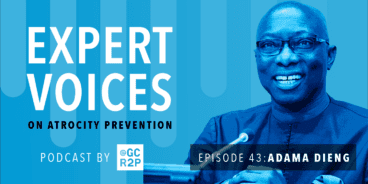
Statement on the Deteriorating Situation in South Sudan, April 2014
Mass atrocities have been perpetrated in South Sudan and will continue unless increased efforts are undertaken to uphold the Responsibility to Protect and end the current internal armed conflict. Civilians face an imminent risk of further mass atrocity crimes as a result of intensifying hostilities between government forces and armed rebels. The threat to vulnerable civilians, over 10,0000 of whom have been killed and more than a million of whom have been displaced by the civil war that started last December, has greatly increased following the temporary capture of Bentiu by armed rebels of the Sudan People’s Liberation Army in Opposition (SPLA I/O).
During the violence in Bentiu between 14 and 16 April the SPLA I/O deliberately targeted ethnic Dinka civilians, resulting in numerous killings and the massacre of over 200 people sheltering inside a mosque. The SPLA I/O also used Radio Bentiu FM to incite attacks, including sexual violence, based upon ethnicity. Thousands of civilians sought protection in the UN Mission in South Sudan (UNMISS) base in Bentiu as a result, increasing the number of civilians sheltering there to 23,000.
On 17 April, in neighboring Jonglei state, armed Dinka protestors attacked an UNMISS compound in Bor, where at least 5,000 civilians, mainly ethnic Nuer, had sought refuge. During the attack at least 50 civilians were killed and over 100 wounded before UNMISS peacekeepers were able to repel the gunmen. Such an attack on a UN base constitutes a war crime and demonstrates the increasing disregard for international law by parties to the conflict. More than 78,500 civilians are currently sheltering in UNMISS bases around the country and remain at risk of further attacks.
Despite the deep political fractures inside South Sudan’s ruling elite that provoked the outbreak of violence last December, issues of ethnic loyalty have become increasingly important in the conflict. Ethnic Dinkas are assumed to be generally supportive of the government of President Salva Kiir while ethnic Nuer form the bulk of the SPLA I/O forces aligned with former Vice President Riek Machar.
Despite reaching a formal Cessation of Hostilities agreement on 23 January, the Sudan People’s Liberation Army and the SPLA I/O continue to engage in open hostilities. Armed combatants on both sides of the conflict have perpetrated ethnic killings and other mass atrocities.
Both the government of South Sudan and the SPLA I/O must uphold their Responsibility to Protect all South Sudanese civilians, regardless of ethnic identity or political affiliation. Both sides must comply with the Cessation of Hostilities agreement and desist from inciting further violence between the Dinka and Nuer communities. It is also critical that leaders from both parties refrain from inflammatory rhetoric directed against UNMISS personnel, including the senior leadership.
The UN Security Council acted in a timely manner by adopting Resolution 2132, which augmented UNMISS’ troop ceiling to 12,500 peacekeepers. However, UNMISS has still not reached full complement and this is preventing the mission from robustly implementing its civilian protection mandate. The UN must expeditiously reinforce UNMISS to ensure it has the resources to frequently patrol outside of its bases and provide urgent humanitarian assistance to civilians. The Security Council should impose targeted sanctions against those violating the Cessation of Hostilities agreement, as well as those responsible for atrocities in Bentiu between 14 and 16 April or for the attack on the UN base in Bor on 17 April.
The African Union’s Commission of Inquiry should immediately investigate all crimes committed since 15 December and impress upon the leaders of both sides the need to hold accountable those who have perpetrated mass atrocity crimes. The UN should actively assist the Commission of Inquiry in its work.
The independence of South Sudan represents one of the UN’s proudest moments so far this century. The developing civil war and the corresponding failure to adequately protect civilians from the threat of mass atrocities leave an indelible stain upon this achievement.
Related Content


Atrocity Alert No. 434: Sudan, Ethiopia and the UN Human Rights Council
